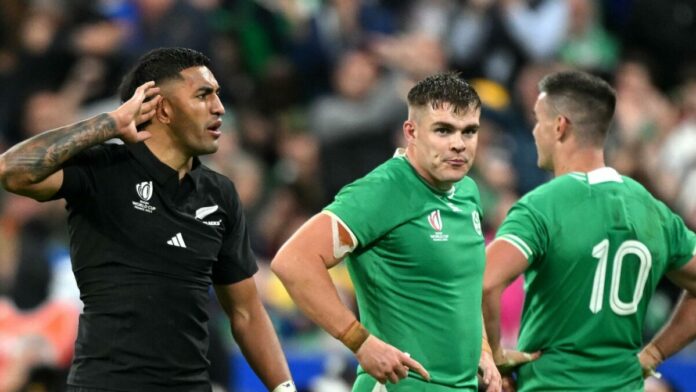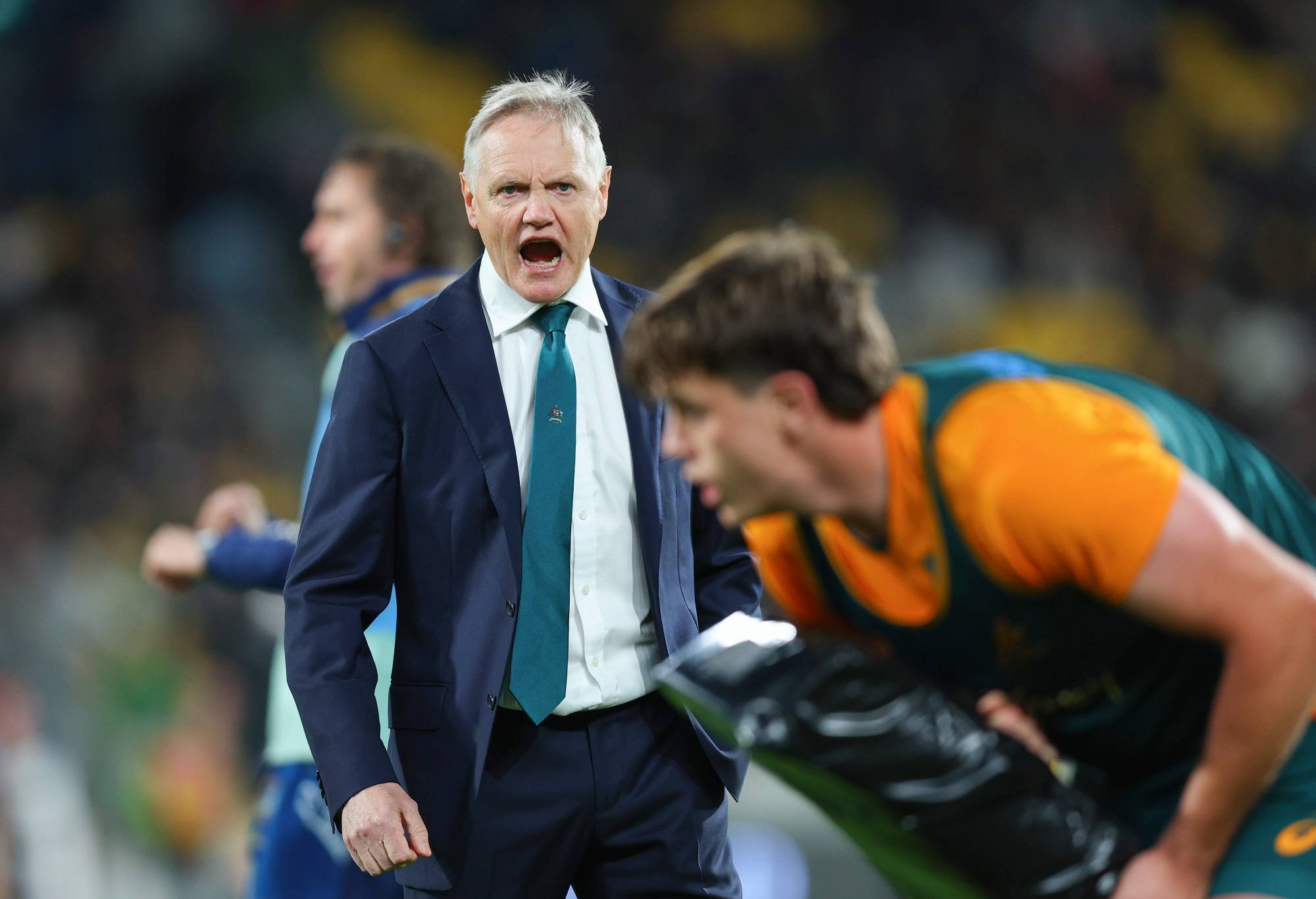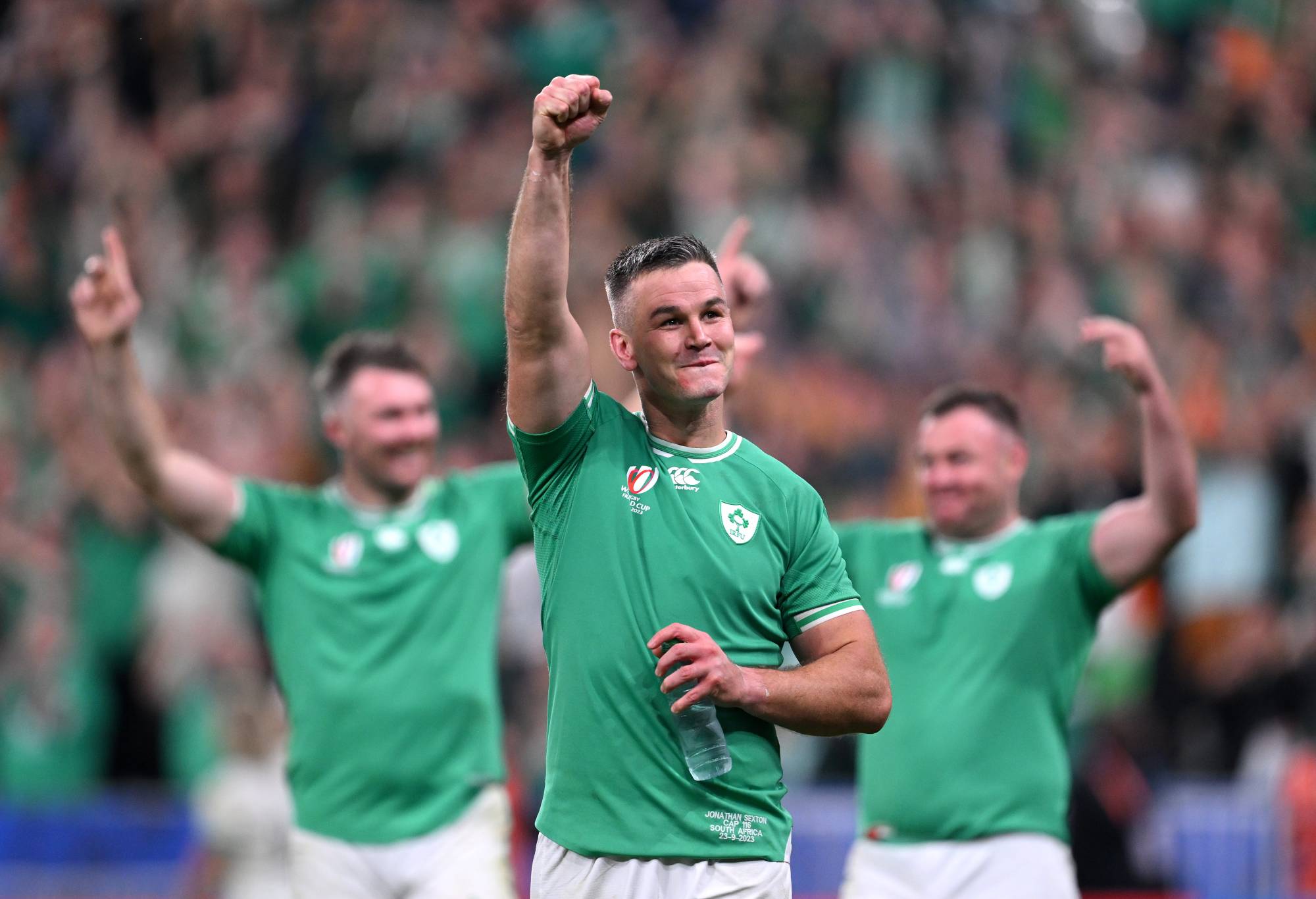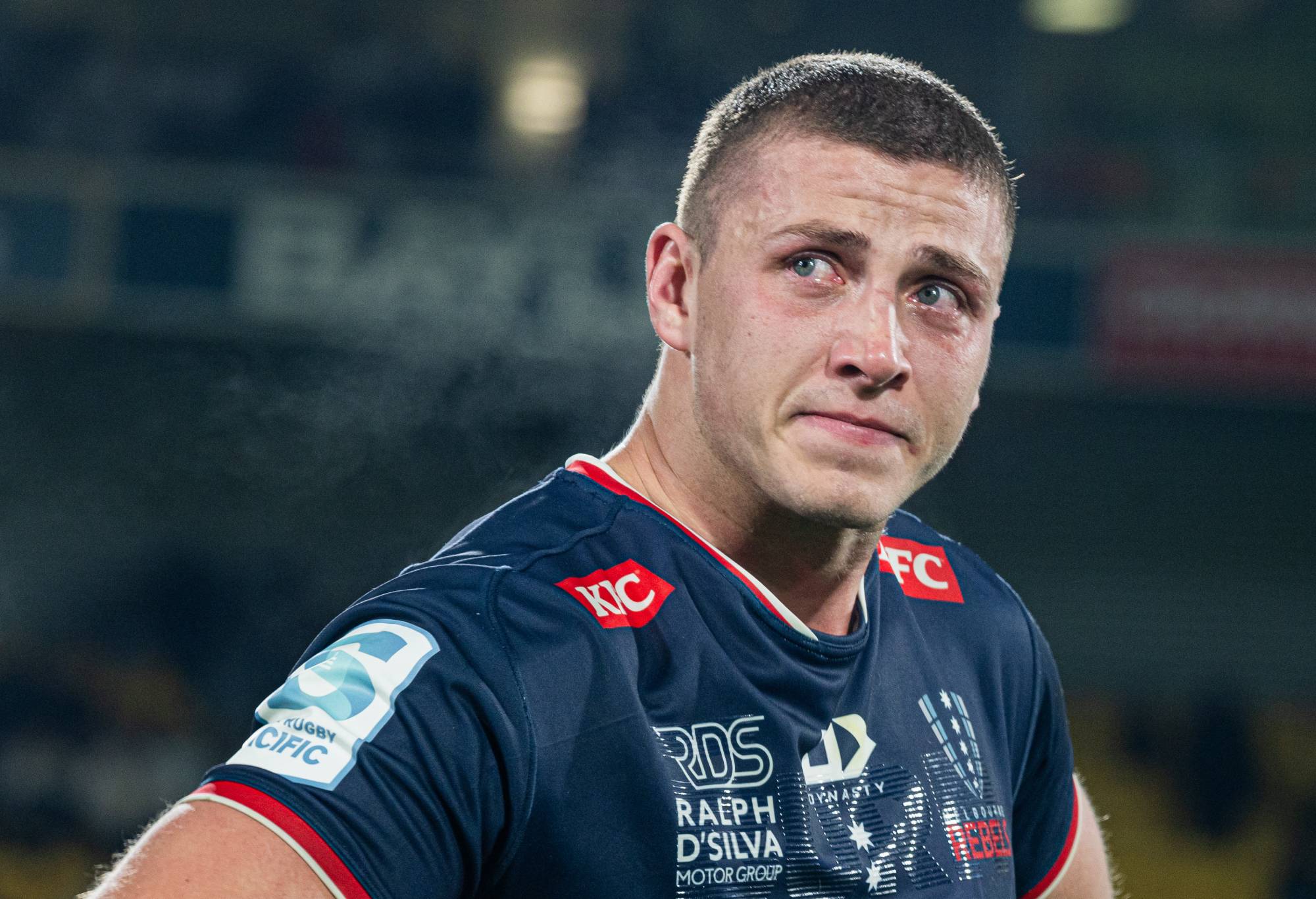
[ad_1]
Publicity around the impending release of Johnny Sexton’s autobiography ‘Obsessed’ certainly raised a storm last week, on a number of fronts.
Intended to enhance the legacy of the author, Sexton’s book also seems to have done wonders for the standing of Rieko Ioane, a player who, for a number of reasons, has never been at the top of many ‘favourite player’ lists.
It might not have had quite the lasting impact of George Gregan’s “four more years” taunt from 2003, but Sexton revealing how Ioane butted in to tell him to “get back ten metres” after Sam Whitelock had won the match-defining turnover in last year’s World Cup quarter-final, has surprised and delighted many.
Firstly, a disclosure. I haven’t read Sexton’s book, so can pass no comment on it. The book is described by people who have read it as “intense, witty, perceptive and frank,” which sounds like four good reasons to give it a spin. And because it is published by Penguin Random House, who are also my publisher and who have been incredibly supportive of my debut crime-fiction novel scheduled for release on February 4th (see what I did there?), I’m backing my stablemate’s book in.
Rieko Ioane. (Photo by Getty Images)
But here’s the other side of things. This is actually Sexton’s second book. For a bloke who never got to experience a World Cup semi-final, that feels like a lot of juice being squeezed from a single lemon.
A lot of players make it through to the end of their careers and don’t even get to publish one book; Chase Tiatia, Hugh Sinclair and Andrew Ready come to mind. There are others. Reggie Goodes for example.
But Penguin and Sexton clearly know their market. Sexton’s mantlepiece might be missing a World Cup medal, but that matters little to overwhelmed staff at the terrific Hodges Figgis bookstore in Dublin, who will struggle to keep up as copy after copy flies off the shelves.
It’s a societal trend for individuals, many of whom might only be one-third or less through their life’s journey, to tie everything together in an autobiography or even a movie. And why should rugby be any different? I’m as ready as the next man for ‘Jeremy Williams; My Life in Rugby.’
The success of Sexton’s book will no doubt have sparked many other rugby personalities to bang away at their keyboards, hoping to tap into this golden seam and bring their stories to the rugby world.
In the coming months, watch out for titles like, ‘Aaron Smith; A Matter of Public Convenience’, and ‘Elton Jantjies; Nutrition Tips for Rugby Players’. And now that he’s reached the pinnacle, it’s well past time for ‘Sacha Feinberg-Mngomezulu; Taking the Piss out of Rugby Commentators.’
It’s not just autobiographies that are in demand, but the self-help segment. ‘Airport Press Conferences for Dummies’ by Eddie Jones has best-seller written all over it, as does ‘The Art of Time Management’ by Mathieu Raynal (translated into seven languages).
It’s clearly also time for a new book from Australian rugby legend, David Campese. Campese was prominent on social media over the weekend taking aim at Wallabies coach Joe Schmidt, concerned that Schmidt doesn’t understand Australian culture and history, and has a poor coaching record.
“Joe Schmidt hasn’t won anything,” Campo implored speaking to the Rugby Paper. “Yes, he might have won a Six Nations” (three actually, plus two European Championships, a Pro 12 championship, and 2018 World Rugby Coach of the Year), but because he hasn’t won a World Cup “he hasn’t won anything.”

Joe Schmidt. (Photo by Hagen Hopkins/Getty Images)
Needing to be a World Cup winner is an interesting qualifier, which narrows the field of available candidates for Wallabies coach down to a select few. Even fewer if the requirement is also that they must be able to prove their Australian-ness by reciting the lyrics to Khe Sanh, eating a jar of vegemite using their finger, and complaining about being directed back to the office after bludging at home for the last three years.
Watch out for ‘David Campese; Navigating the Cavernous Gap Between Great Player and S–t-take Merchant’ in all good bookstores, soon.
The problem with rugby books is that the vast majority are autobiographies. Thus by design, there has developed a mind-numbing sameness to them. Invariably, the reader’s view of the book is shaped, not by what is on the page, but by their opinion of the subject.
Sexton, Dan Carter, George Gregan, Martin Johnson, Alun Wyn Jones, Siya Kolisi and so on and so on. It doesn’t take much to figure out that, no matter what ‘revelations’ and ‘insights’ might be provided within, there’s a ready-made audience waiting to lap it all up.
Occasionally, a sub-legendary player but someone who has cultivated a brand, joins the autobiography stakes; Joe Marler, Danny Cipriani, Adam Jones and Ali Williams among them. But does a bit of quirkiness and some off-the-wall humour necessarily make a great rugby book?
There are also the books that – because of the subject and/or the ability of the ghostwriter – really do provide a fresh and appealing perspective. ‘Anton Oliver Inside’ from 2005, is one such example, and I have hopes for Sam Whitelock’s ‘View from the Second Row’, knowing he is in the hands of the accomplished and always interesting sportswriter, Dylan Cleaver.
But these are exceptions. It’s not the fault of players or that they don’t have interesting stories to tell. It’s just that there can only be so many variations on the same theme.

Johnny Sexton. (Photo by Laurence Griffiths/Getty Images)
A few years back, I literally had to beg my mother to stop sending me the latest rugby autobiographies as each birthday and Xmas rolled around. “I’ve read it,” I would tell her.
“But you can’t have, it’s only just come out,” she would say.
“Trust me Mum, I’ve read it,” I’d reply. Over and over.
Beyond autobiographies, pickings become richer. Everyone will have their own favourites, but mine is probably Donald McRae’s ‘Winter Colours’. Published earlier this year, ‘Concussed’ by Sam Peters is an important contribution to the ongoing player safety debate.
Then there are the ‘coffee table’ books. Ours was one of thousands of New Zealand households that had a glass-topped coffee table custom built, so as to house the deluxe version of ‘Men in Black’, when it was first released in 1978.
‘Immortals of Australian Rugby Union’ by Gordon Bray was released in July, and it is a beautifully presented tribute to the players selected and a welcome nod to when rugby was more prominent in the Australian consciousness.
Which leaves one more book to add to the pile.
To be released on Tuesday October 29th, published by Leschenault Press, ‘A Year in the Life and Death of the Melbourne Rebels’ is a modest addition to the body of rugby works, but one that, given the way things played out in 2024, should be of great interest to rugby fans.
The original intent was to take readers inside a professional rugby franchise to reveal its detailed inner workings. To explore the interrelationships between players, coaches, high-performance staff and non-rugby staff, and to demonstrate how all of that comes together to deliver what people get to see on the field, during the competition.

Josh Canham after the Rebels’ last ever game. (Photo by James Foy/Speed Media/Icon Sportswire via Getty Images)
In that respect, the book will appeal to fans of all teams, not just the Rebels. While some operations do better than others, and the individual personalities and skill sets vary, the fundamental approach is similar across all professional rugby franchises.
Granted unprecedented access inside the Rebels’ tent, I’m hopeful that I’ve been able to use that privilege to provide genuine insights for readers, and give them a better understanding of the roller coaster ride that is a Super Rugby season.
Obviously, this particular ride was something that for the people inside the organisation – and the fans – was particularly harrowing. In that respect, the book was unavoidably tugged in a direction it was never intended to go.
Nevertheless, the journey to termination of the club also provided an opportunity to highlight a group of people who, time and again, stood up under immense pressure. Again, I can only hope I’ve done justice to those people in the telling of their stories.
As for what this all means for the future of Australian rugby, Rugby Australia CEO Phil Waugh and chairman Daniel Herbert were adamant at the time of the termination announcement, and subsequently, that Rugby Australia is fully committed to investing in rugby pathways in Victoria.
That’s all well and good, but if we are to judge actions instead of words, last week’s announcement that the Rebels Super W side will be excluded from next year’s competition – ostensibly because the Victorian state government wouldn’t agree to paying what amounted to a hefty participation fee – means that things don’t look promising.
This year, the improvement in the Rebels’ Super W side was profound. They beat the Fijian Drua and only a late missed penalty from a handy position cost them a win against the Reds. With this announcement, the only winner is the NRLW.
Matters between Rugby Australia and the Melbourne Rebels Rugby Union (MRRU) will be played out in due course. Some of the background to that is explored in the book, and may well surprise a few readers who, for some unfathomable reason, have been quick to form opinions without being party to all of the information.
Pre-ordering for ‘A Year in the Life and Death of the Melbourne Rebels’ will be available from all major on-line retailers, soon. In the meantime, mark down November 9th as a ‘can’t miss’ date in your diary, when Rieko Ioane takes the field for the All Blacks at the Aviva Stadium.
[ad_2]
Copyright for syndicated content belongs to the linked Source link

